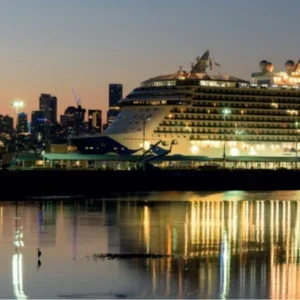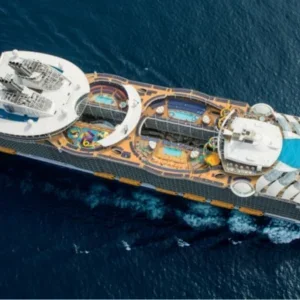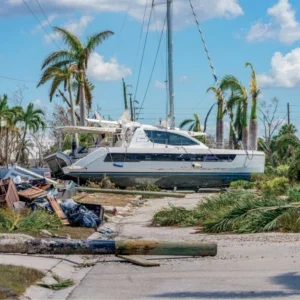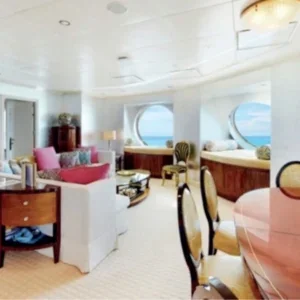When it comes to the environment, the cruise industry hasn’t always enjoyed the best reputation, but in recent times, operators have made substantial efforts to improve. Operators, governments and legislators are in agreement that, when visiting some of the world’s most ecologically sensitive landscapes, cruise lines are duty bound to help preserve these vulnerable areas. For operators, this means a range of measures including the reduction of fuel consumption and unnecessary waste, and the introduction of the latest technology to help reuse water and conserve energy. While there is always more that can be done, the cruise industry is now taking significant steps to reduce its impact on the planet.
In the opinion of Jamie Sweeting, chairman of Sustainable Travel International and global sustainability adviser to Royal Caribbean Cruises, the industry wasn’t as green as it could be, but he now thinks operators should be given more credit for the improvements they have made in the last 15 years. "The industry had a wake-up call in the late 1990s and really began to change its focus," he explains. "The first decade of this century witnessed an increasing awareness of the important issues and we have come a long way."
In 2009, Royal Caribbean Cruises published its first annual stewardship report, targeting a cut in its carbon footprint by an ambitious one third per available passenger cruise day by 2015. Outlining recent performance, progress and activities in nine areas of stewardship – energy and air emissions; water and wastewater; waste and chemical management; conservation, destinations and education; community involvement; safety and security; medical operations; public health; and human resources – across Azamara, Celebrity and Royal Caribbean International ships, it was a move towards transparency that excited the wider industry.
"Transparency is always a good thing," agrees Rich Pruitt, AVP, safety and environmental stewardship at Royal Caribbean Cruises. "Our bottom line is if we don’t have great destinations to visit, we won’t have a business. We’re starting out from a premise that says no emission is the best emission. So I would say all the lines have very aggressive energy-efficiency programmes, on a practice and procedure side as well as on the technology side. Again, we train our crew members, we educate our guests and we ask our guests to help out and participate. We do that through providing written materials onboard and announcements when they board the ship; when there’s a get-together onboard you’ll have senior officers encouraging guests to pitch in and do what they can to reduce energy consumption onboard."
Sweeting is also passionate about Royal Caribbean’s environmental policies. After 15 years working as a conservationist, he joined the company in 2008, believing he could achieve more for the environment from within the cruise industry than he could as an external adviser. He stepped down from his role as VP for environmental stewardship earlier this year, but is retained in an advisory role.
"The environment is the defining issue of our time, and we are doing what we can to play our part and minimise greenhouse gases," he says. "A major area of focus is reducing fuel consumption: the less you burn, the smaller the carbon footprint."
A win-win situation
The company has also taken steps to reduce the amount of water used onboard; is finding new ways to deal with wastewater, including through the introduction of advanced purification systems; and is making ongoing advancements in waste management.
"The cruise ships, I think, do a great job because we understand that it’s incumbent upon us to protect the waters that we take our guests to see," Pruitt says. "The cruise industry has done a great job at dedicating space onboard, equipping the ships with various types of machines and systems that allow us to reduce the volume of recyclable material and hold it even longer so that we can optimise our offloads to capitalise on where it’s possible and most advantageous to land various types of waste. Not every port can recycle glass, plastic or aluminium, or even office paper, so we have to optimise our offloading schedules.
"We’re looking under every rock. We’re trying everything we can to reduce energy consumption onboard. It’s a business value proposition for us. If we burn less fuel, we lower our costs. It’s great that we get a win-win where we can save money and also benefit the environment by reducing the amount of energy we consume and the amount of fuel we have to burn."
Sweeting thinks operators have a responsibility to make these improvements, and he believes the sector is working together in order to change. "Essentially, we’re pretty collegial within the industry," he says. "This is a non-competitive space and we share developments. When trying new things, we believe that it is in our best interests to share information about what does and doesn’t work. We encourage our colleagues to improve their practices because we are only as good as the weakest operator."
In recent years, Sweeting has noticed a significant increase in the number of regulations introduced, working towards engendering better behaviour whether the "weakest" operators are keen or not. And it is not just at sea where one must act responsibly; relationships with ports are also of paramount importance. "We have four million passengers on our vessels each year, so we play an important role in how to be good tourists," he says. "We strive towards sustainability and work with these destinations to be part of the solution."
Room for improvement
The industry has undoubtedly taken huge steps forward, but environmental campaigners argue there is always more to be done. Marcie Keever, Friends of the Earth’s oceans and vessels project director, is encouraging the industry to continue its investment in the technology that can help it to protect vulnerable areas. "Cruise ships visit some of the most ecologically sensitive places in the world, so they need to do as much as possible to reduce their impact," she explains. "The livelihood of these companies depends on these areas remaining pristine."
Keever welcomes the efforts already made, and hopes operators will continue to move forward. "There are many environmental initiatives in place, which are much appreciated, but there are key things that can still be done," she continues. "We would like to see the latest technology used to deal with sewage, and more use of shoreside power, in partnership with ports. This is starting to happen on the east coast of the US and is being considered in Italy. We would also like to see ships using cleaner fuel everywhere, and we are really pushing for the introduction of stronger industry-wide standards."
At Royal Caribbean, as with a number of other operators, concerted efforts are already being made in this direction. "The industry is again one of the leaders in trialling some of these air emissions-reduction technologies, whether it’s engines that do a better job with electric timing to reduce the amount of smoke or make them more energy-efficient, or the use of exhaust gas scrubbers onboard to try to treat the exhaust gas before it leaves the ship," says Pruitt.
Furthermore, Sweeting thinks the industry’s environmental image is sometimes misunderstood. "I have brought colleagues in from the conservation world who have been stunned by what we are doing – they presumed we would be awful," he says. "I think we are doing a much better job than the average hotelier or tour company."
But there is always room for improvement. With pressure being applied internally as well as through ever-more stringent legislation, environmental stewardship has fast become a core business concern. No operator, however big or small, can afford to dismiss it. "We are far from perfect, but you can be sure that we are paying attention," concludes Sweeting. "Our mantra is that we will be better tomorrow than we are today."






